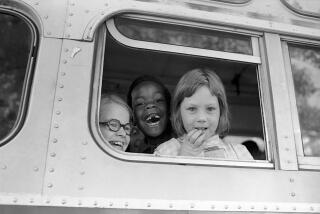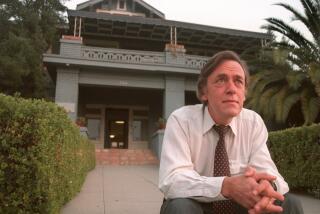Attorney G. William Shea, Integration Specialist, Dies
- Share via
G. William Shea--the attorney who successfully argued before the U.S. Supreme Court in 1982 that Los Angeles should not have a mandatory student-desegregation busing program, 27 years after he led the successful fight to integrate the city’s Fire Department--has died at 75.
Shea, who practiced law here for more than 30 years, succumbed to cancer Friday at his home in the San Diego County community of Leucadia.
Associates stressed that Shea’s opposition to mandatory busing on behalf of the Los Angeles Board of Education was in no way inconsistent with his earlier battles as chairman of the Los Angeles Fire Commission to win full equality for blacks as firefighters.
On Side of Integration
“Throughout his life, Bill was very much on the side of integration,” said Peter James, a fellow partner with the Los Angeles firm of McCutchen, Black, Vergler & Shea.
James said Shea was a professional, representing a client in the Supreme Court case, “and it was the school district’s position that mandatory busing was not the appropriate remedy.”
Emotions ran high during the lengthy courtroom battles over the school busing issue, but when it was all over, opponents complimented the white-haired, amiable Shea on his handling of the case.
“I thought the way he conducted himself was appropriate as an attorney and a credit to the profession,” said American Civil Liberties Union attorney Fred Okrand, who remembered Shea as a “hard-hitting” and “able” adversary.
Worked in New York
A 1937 graduate of the University of Pennsylvania Law School, Shea moved to California in 1942 after working in the New York City corporation counsel’s office.
During the 1950s, Shea was active in civic affairs here, serving as an appointee of Los Angeles Mayor Norris Poulson on the city’s Fire, Harbor, Coliseum and Recreation and Parks commissions.
It was in 1955, shortly after his appointment to the Fire Commission, that Shea locked horns with Fire Chief John H. Alderson.
The city at that time had two fire stations staffed entirely by blacks, with no blacks at any of the other stations. Despite this, Alderson contended, the department was integrated.
Controversy Peaks
The controversy came to a head when Alderson transferred five black firefighters from a newly integrated station back to the all-black stations “to avoid bloodshed by outside interests.”
Despite the fact that Alderson had already announced his resignation, effective at a later date, an angry Fire Commission, led by Shea, relieved Alderson of his duties on the spot. With Alderson out of the way, the integration effort accelerated.
“It was one of the things Bill was proudest of,” James recalled Saturday.
Shea was named vice president of the California State Bar in 1969 and served as president of the Los Angeles County Bar Assn. in 1973 and 1974. In 1983, he received the county Bar’s highest honor, the Shattuck-Price Memorial Award, for “outstanding dedication to the high principles of the legal profession.”
Respected for Candor
“When you think of him, the word that comes to mind is integrity,” said Mike Johnson, another partner in Shea’s firm. “He was not the kind of lawyer who tried to put something over on people. . . . He was respected for his candor, his persuasiveness and his legal abilities.”
Shea, who had lived in semi-retirement in San Diego County the past two years, leaves his wife, Marilyn; sons Brian and William of Los Angeles and daughter Karen McGowen of Fresno, and seven grandchildren.
Services will be held at 7:30 p.m. Monday at St. Paul the Apostle Church in Westwood. In lieu of flowers, the family asks that donations be made to the American Cancer Society.
More to Read
Sign up for Essential California
The most important California stories and recommendations in your inbox every morning.
You may occasionally receive promotional content from the Los Angeles Times.










